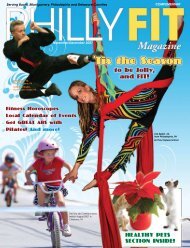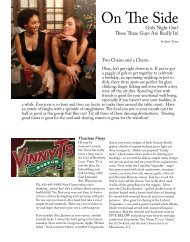PhillyFIT Magazine
PhillyFIT Magazine
PhillyFIT Magazine
Create successful ePaper yourself
Turn your PDF publications into a flip-book with our unique Google optimized e-Paper software.
Minimizing<br />
Emergency<br />
Veterinary<br />
Visits this<br />
Holiday Season<br />
Healthy Pet Section FurryFriendFIT<br />
5) Raisins. Raisins are fatally toxic to some dogs, even in relatively<br />
small quantities. It is unknown which dog (or possibly<br />
which raisin) will have a problem, so it’s recommended to keep<br />
dogs away fromraisins in general.<br />
6) Many other foods items such as macadamia nuts, grapes, coffee,<br />
alcohol, moldy food, and uncooked meats can also cause<br />
toxicity and disease in dogs and cats, and should be avoided.<br />
Holiday Plants Dangerous to Pets<br />
Many of us enjoy the sights and smells of seasonal plants<br />
around the holidays. However, some of them are mildly to<br />
moderately toxic to dogs and cats. Minimizing pet exposure or<br />
eliminating these plants from the home altogether is recommended.<br />
By Jamie M. Burkitt, DVM<br />
The holidays are a fun time of year, but the associated celebrations<br />
often include food, plants, and other items that can be<br />
dangerous for pets. It’s important to keep these things in mind<br />
to minimize the likelihood of your pet getting into trouble and<br />
requiring urgent care.<br />
Holiday Foods Dangerous to Pets<br />
All foods in the list below should be kept away frompets altogether.<br />
It’s best to report any ingestion to a veterinarian immediately.<br />
1) Mistletoe. The berries and leaves of mistletoe are toxic, and<br />
can cause gastrointestinal and cardiovascular problems. It is<br />
safest to avoid mistletoe if you have pets, since problems can be<br />
quite severe. However, if your pet ingests mistletoe, call a veterinarian<br />
immediately for advice.<br />
2) Holly. Holly is mildly toxic, and ingestion can cause irritation<br />
to the mouth and upper gastrointestinal tract. Most commonly,<br />
pets that eat holly leaves will show hypersalivation, head<br />
shaking, pawing at the mouth, poor appetite, and some vomiting.<br />
These signs may be mild or can be severe in some cases.<br />
Ingestion of large quantities can cause obstruction of the gastrointestinal<br />
tract, which is an emergency indicated by moderate<br />
1) Chocolate. Chocolate is toxic to dogs, and the darker (purer)<br />
the chocolate, the more potential for toxicity. Therefore, even<br />
small amounts of baking chocolate, cacao beans, cacao nibs,<br />
cacao powder in baked or unbaked items, or dark / semisweet<br />
chocolates can cause severe problems. Mild chocolate toxicity<br />
leads to vomiting, diarrhea, and some hyperactivity, while<br />
severe chocolate toxicity can cause heart rhythm abnormalities,<br />
seizures, collapse and even death. Be sure to keep your furry<br />
friends away fromthe chocolate treats this season! If Fido does<br />
accidentally get into treats containing chocolate, call a veterinarian<br />
for advice.<br />
2) Xylitol. Xylitol is an artificial sweetener found in many<br />
sugar-free gums, candies, vitamins, and medications for<br />
humans. It can also be purchased in bulk as a sugar substitute<br />
for baking. While xylitol has some known benefits to dental<br />
health in people, it is highly toxic to dogs and can cause low<br />
blood sugar and liver failure in dogs. If your pet ingests xylitol,<br />
immediately take him to a veterinarian for attention, as the side<br />
effects can be dire.<br />
3) Onions, garlic, leeks. These and other similar pungent root<br />
vegetables and their extracts cause anemia and potentially<br />
bleeding abnormalities in dogs and cats. Cats are particularly<br />
sensitive to the effects of these vegetables, while dogs are somewhat<br />
more resistant. In general, pets should not be fed items<br />
that contain onions, garlic, and similar as seasoning.<br />
4) Nutmeg. In relatively large quantities (i.e. ¼ tsp. or more),<br />
nutmeg can cause gastrointestinal upset and hallucinations in<br />
pets, and so should be avoided.<br />
November/December I 215-396-0268 I www.phillyfit.com <strong>PhillyFIT</strong> I 39
















